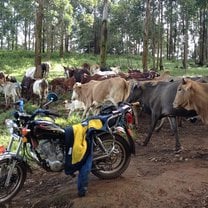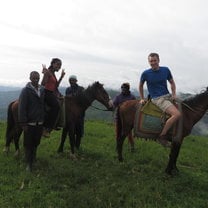Be open-minded and don’t go there with any big assumptions about what Belo is like; especially if this is your first trip to Africa or the developing world. It is very clearly the developing world, but it isn't the extreme wilderness that some people might imagine. It’s a relatively normal place, just without the same luxury that we have in the west.
Be prepared for a different way of life (i.e. not many tarmac roads, and don’t be shocked when there’s a power cut or the internet doesn’t want to work properly), but there’s still enough familiarity with the west that you won’t feel completely alienated. Make a bit of an effort and you’ll get on well.
Some things are just done in different ways. Taxis, for example, don’t function like they do in England. Firstly, you have to find a taxi that is going to where you want to go. Then you have to wait until the taxi is full because you pay per person and empty space means the taxi driver loses money. When I say full, I mean full. Minimum in a 5 seat car is 4 in the back and 2 in the passenger seat.
There will often be another passenger sharing the driver’s seat with the driver as well. People will be dropped off and picked up on the way, so get used to sharing car seats. I don’t know if that counts as culture, but as far as getting on with the local population, I found everyone is generally much easier going than in England and much more friendly. It’s easy to find your feet there and get on with people.
There wasn’t a massive language barrier. Cameroon is a bilingual country (French and English) and Belo is Anglophone, so English is very widely spoken. I don’t speak French, so landing in Douala (in a Francophone region) could have caused problems but Joshua was with me the whole time I was there. In Belo, the local dialect is Kom, which is spoken by everyone in the village.
No one would expect you to be fluent when you go out there but people really appreciate when you try, even with small things like “good morning” or “thank you”. People are friendly regardless, but they’ll be even more friendly if they hear you trying to speak in their dialect. Also, you’ll probably hear the word “wabangna” a lot which is Kom for “white person”. Once I learnt what it was I started hearing it everywhere. You’ll get used to it.









